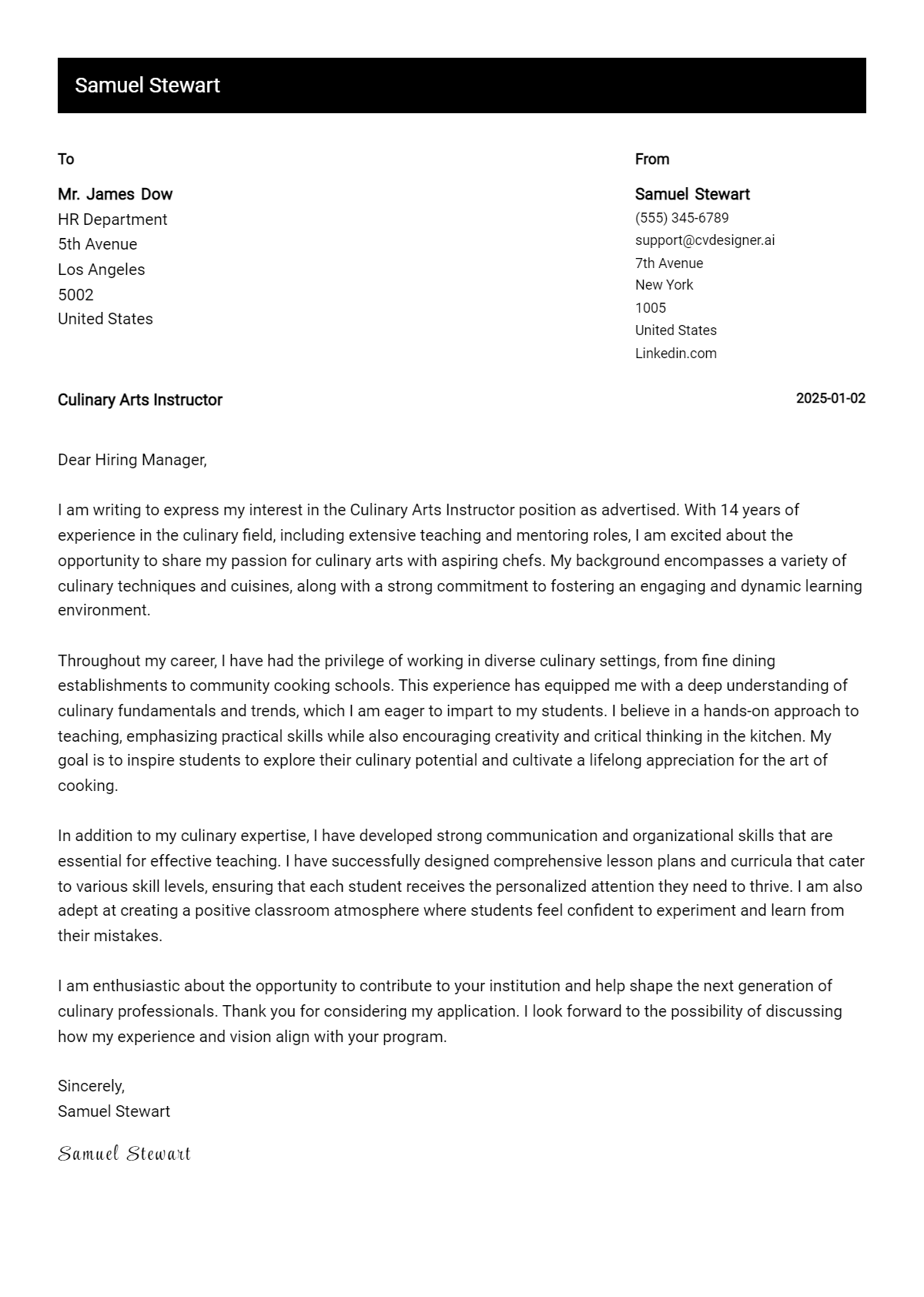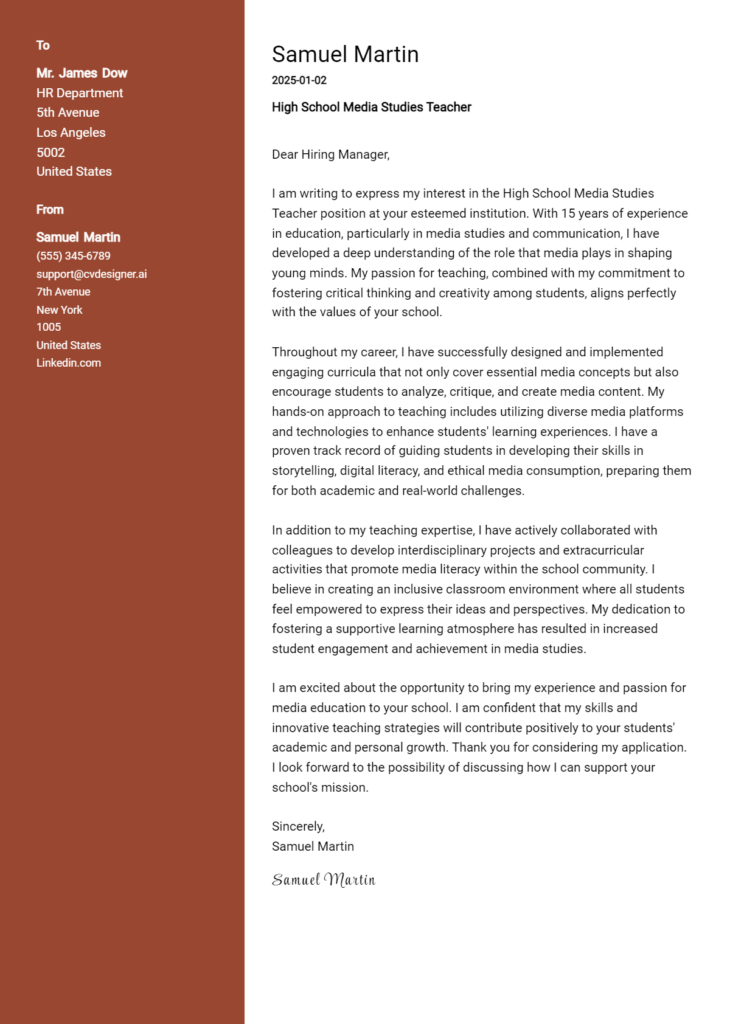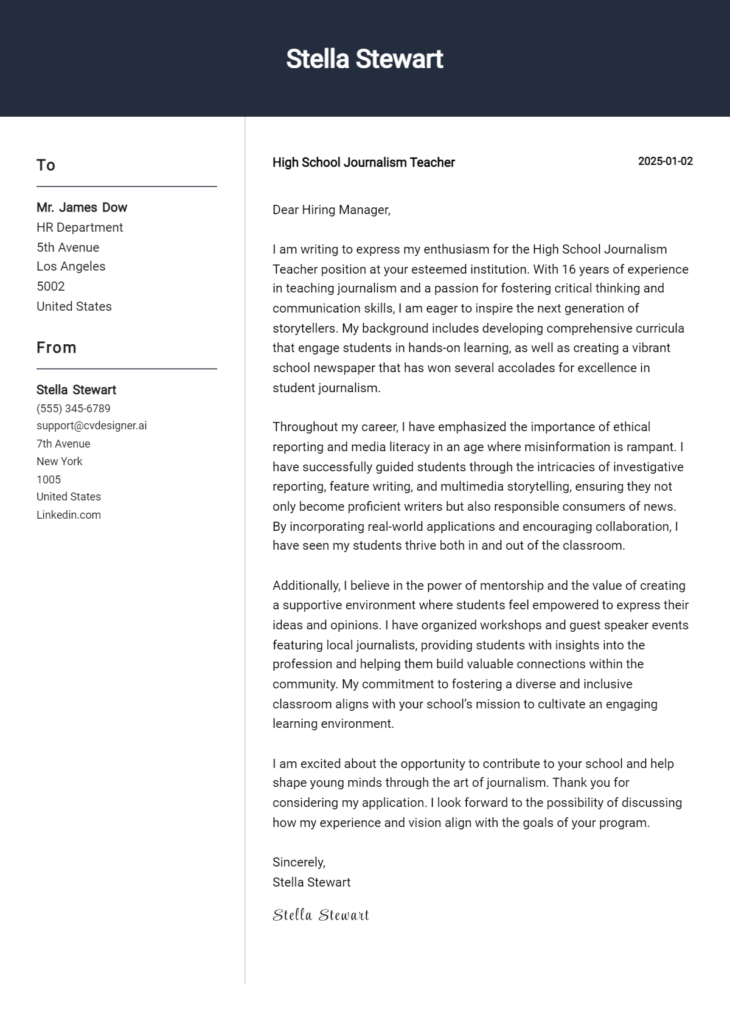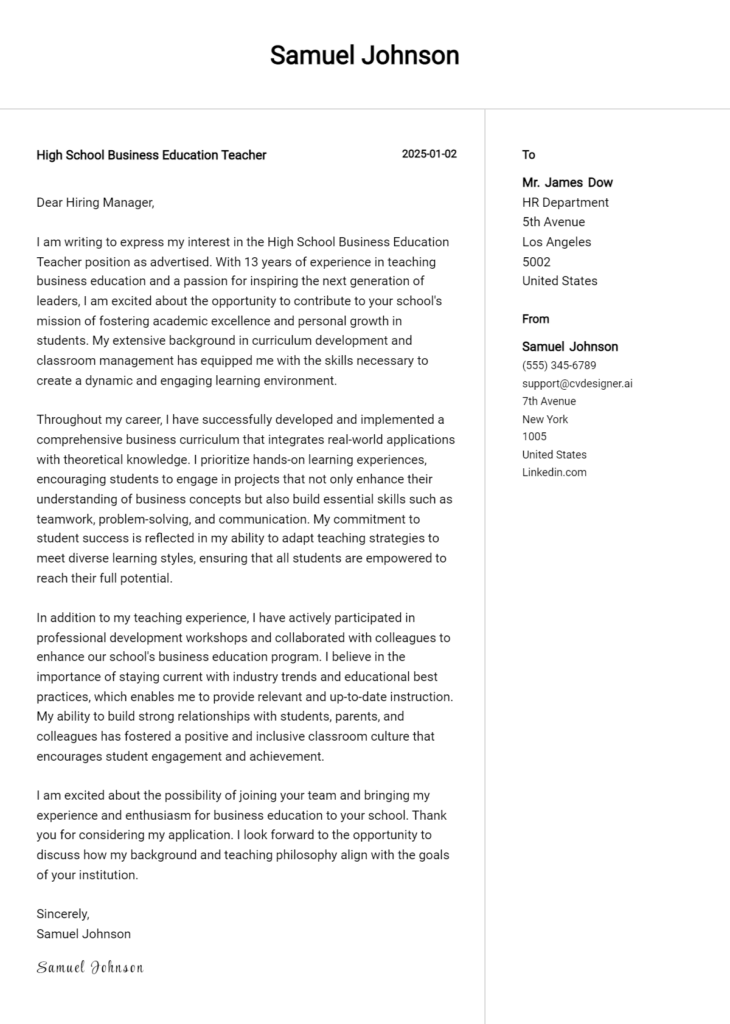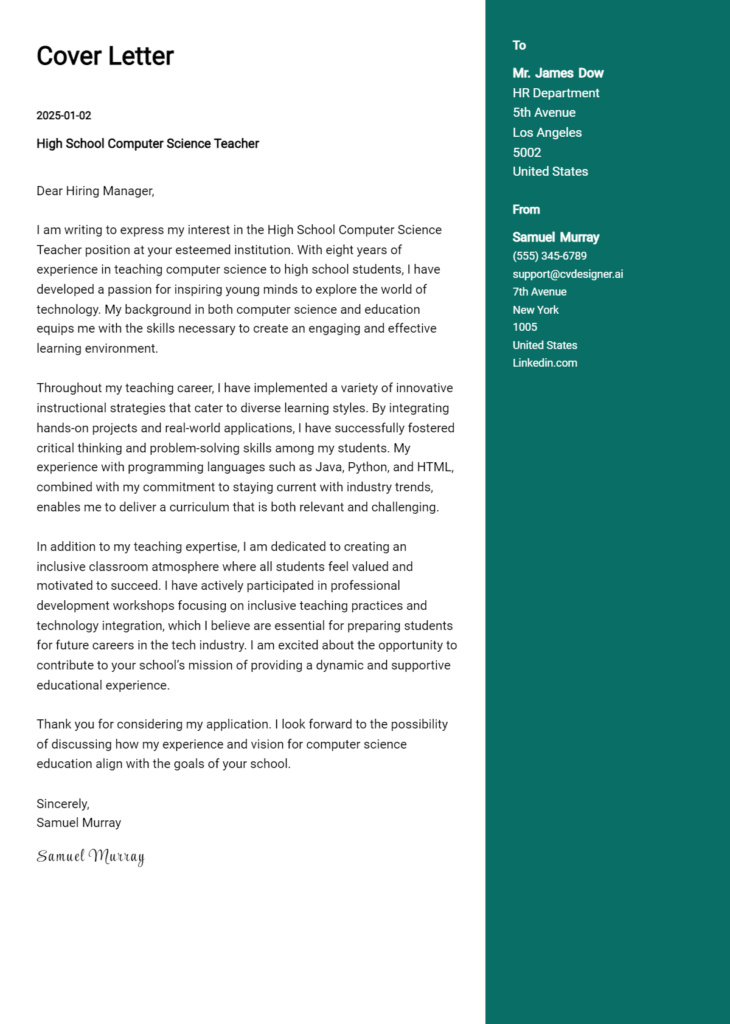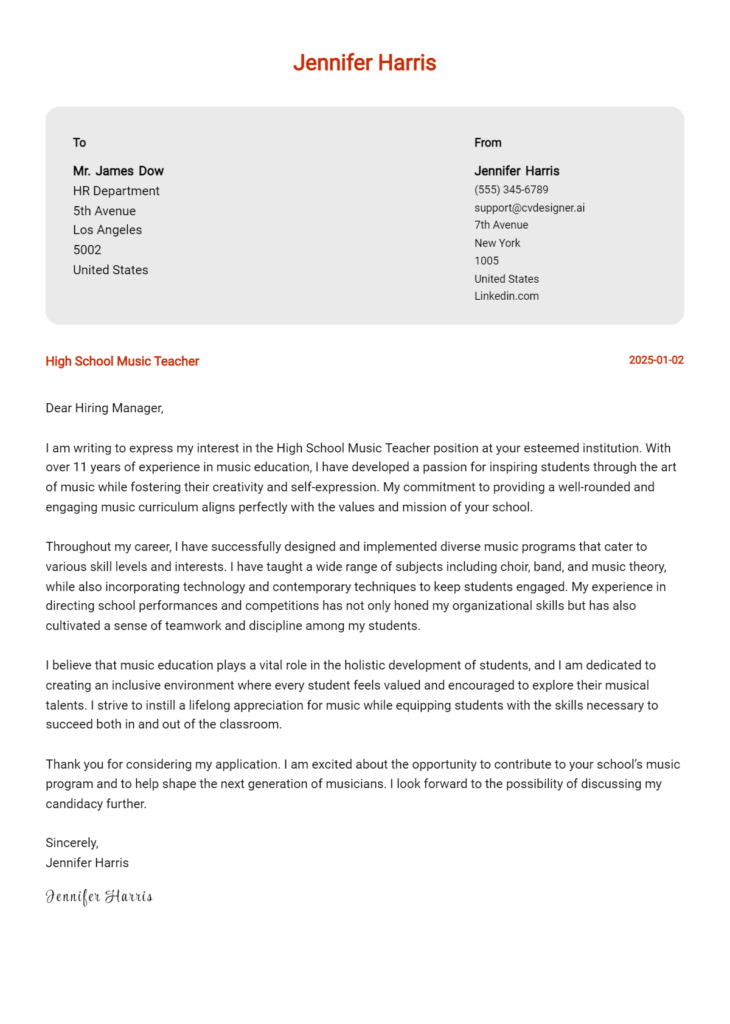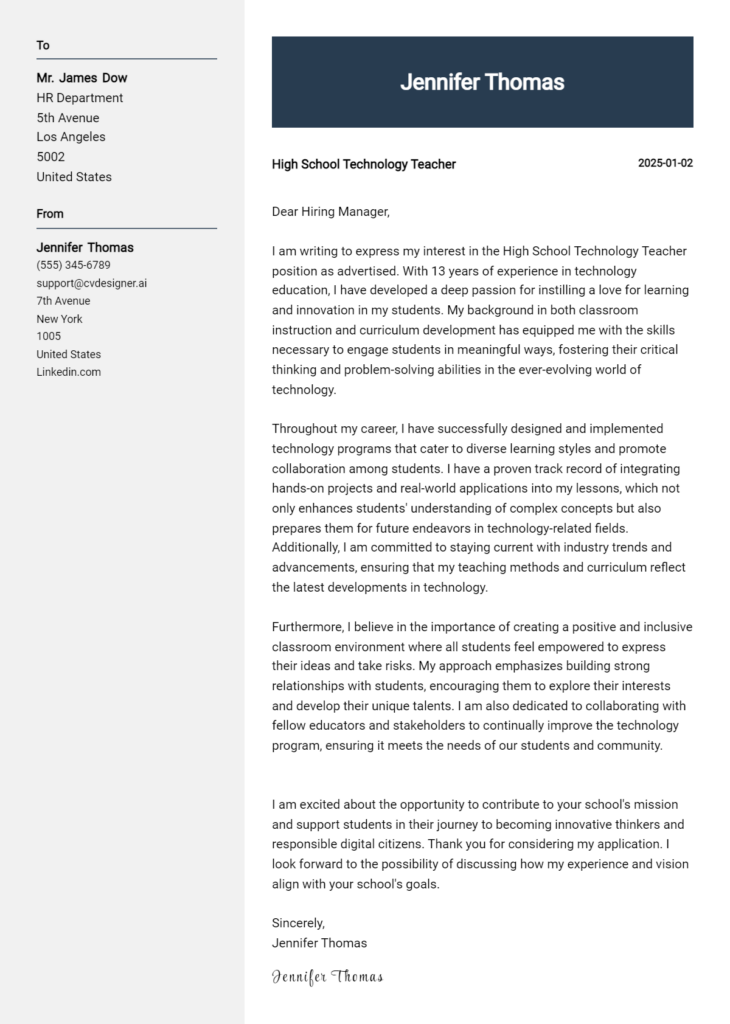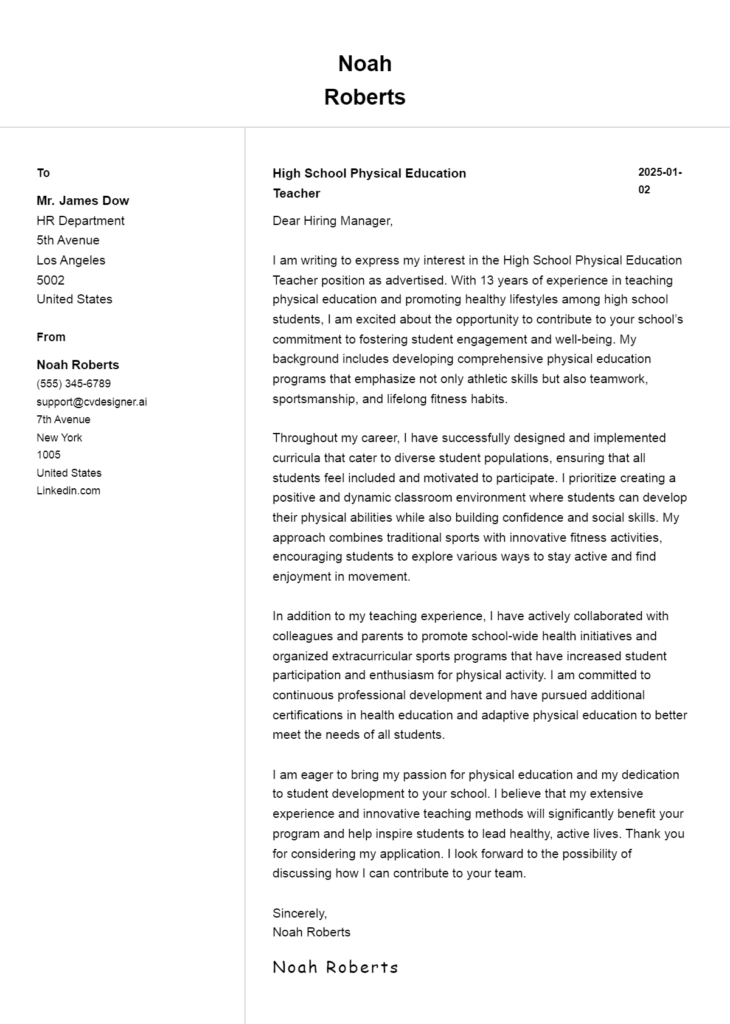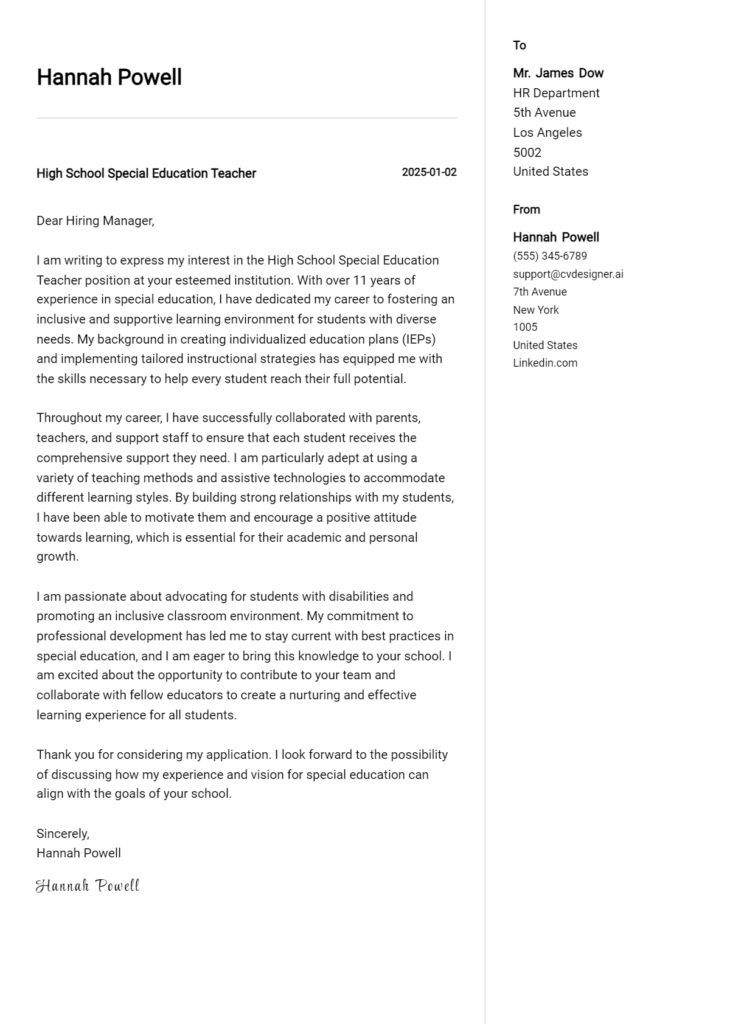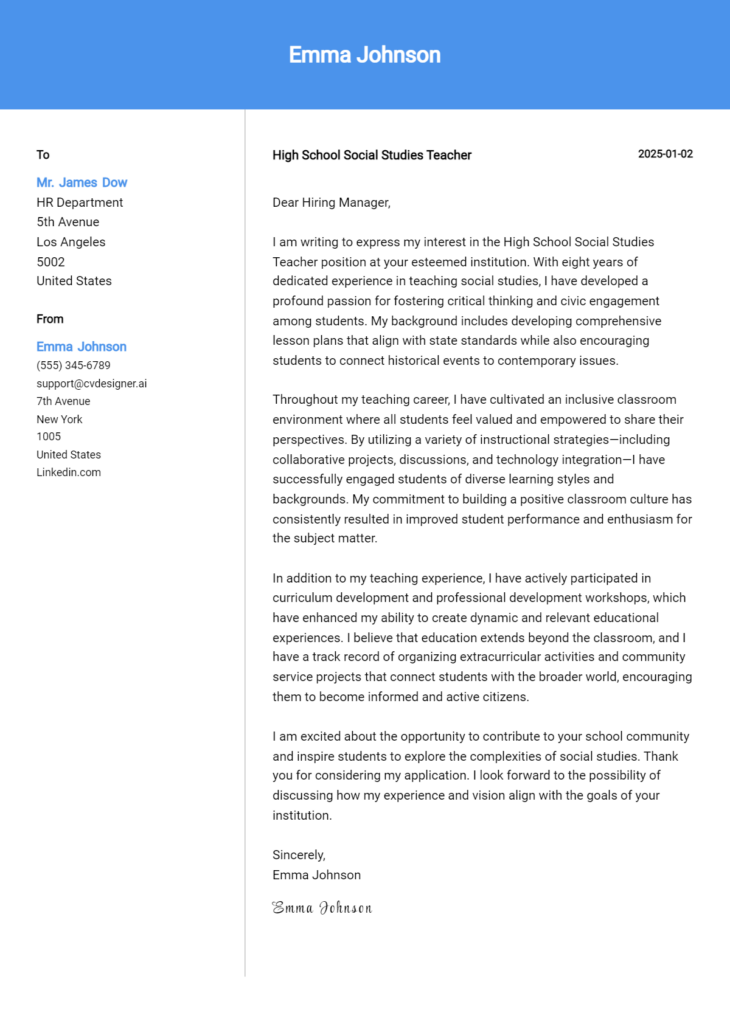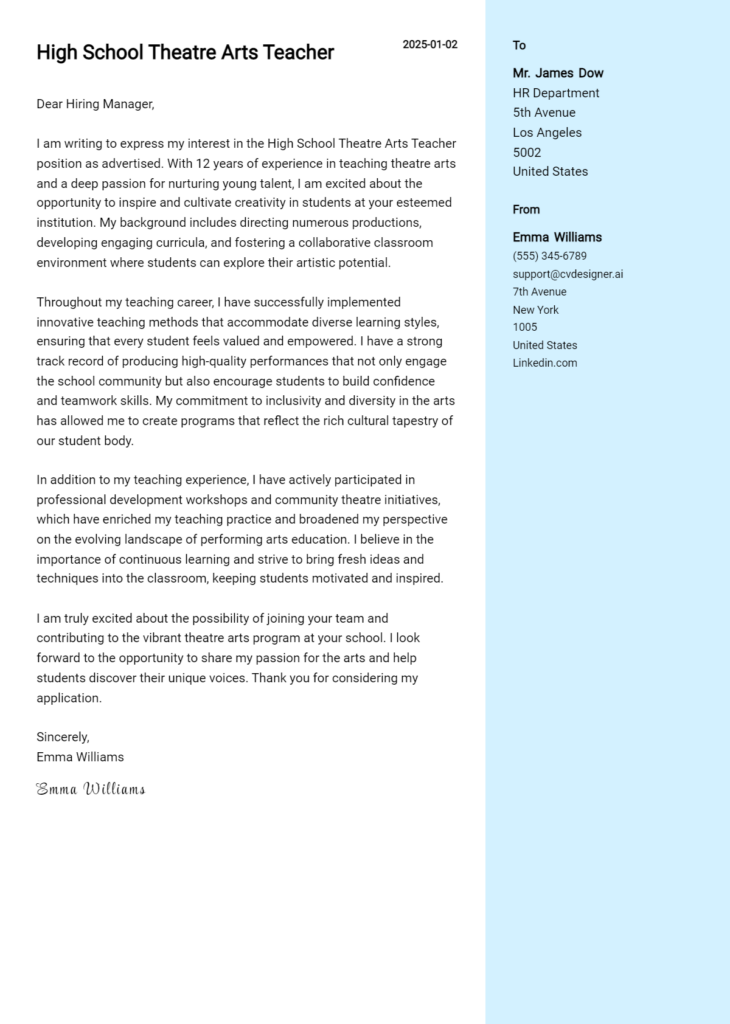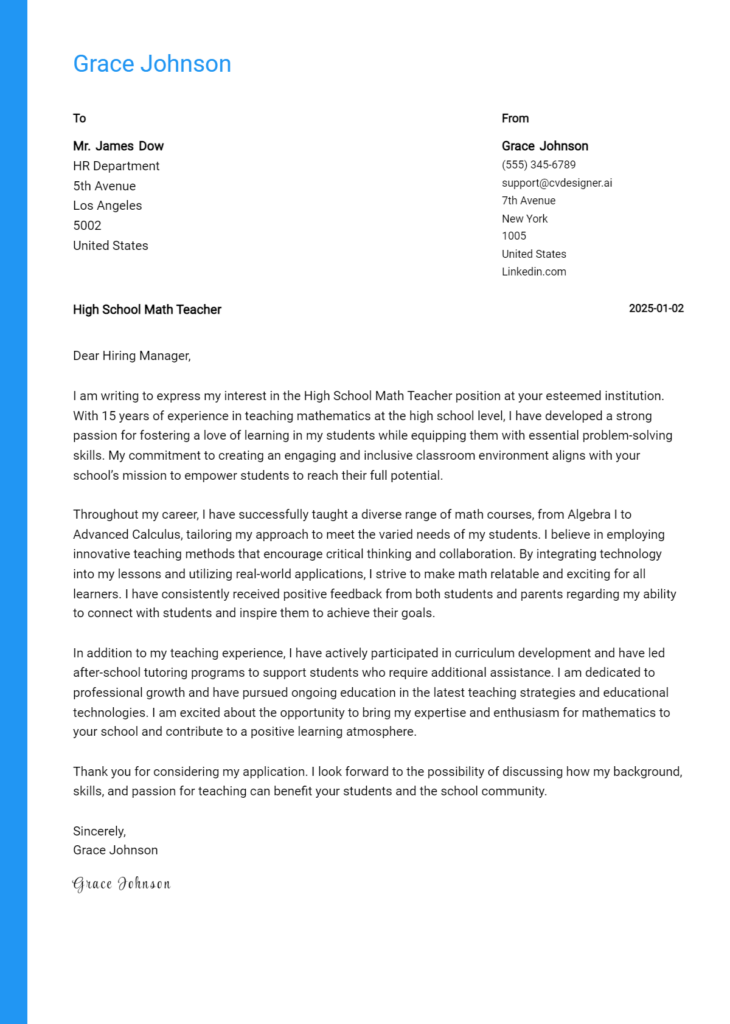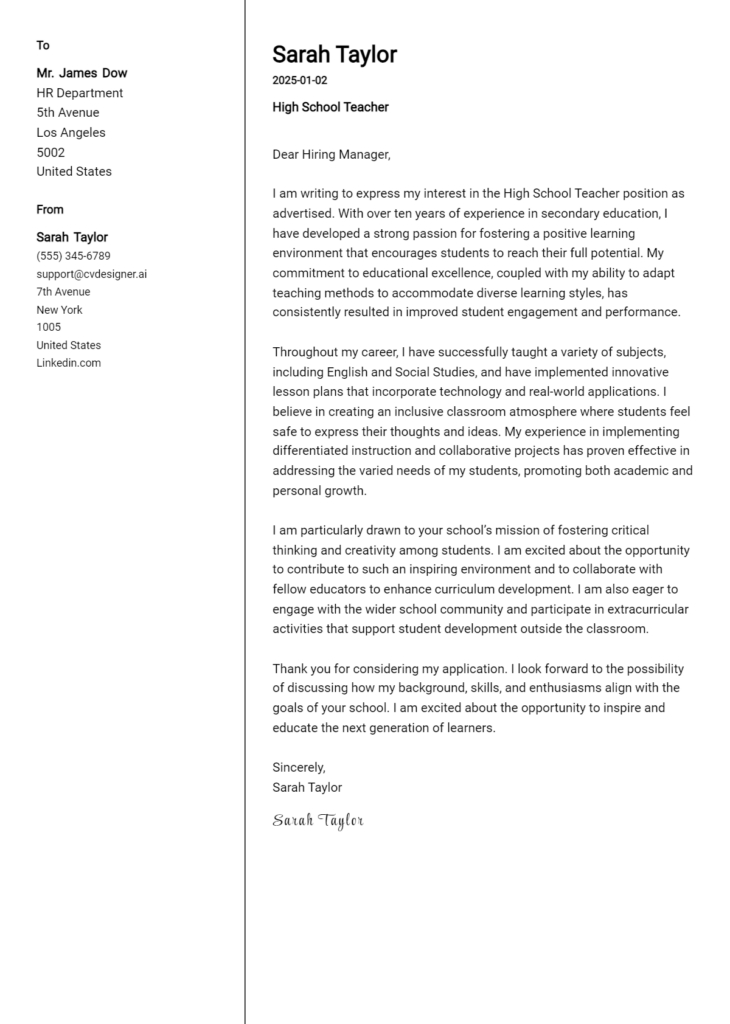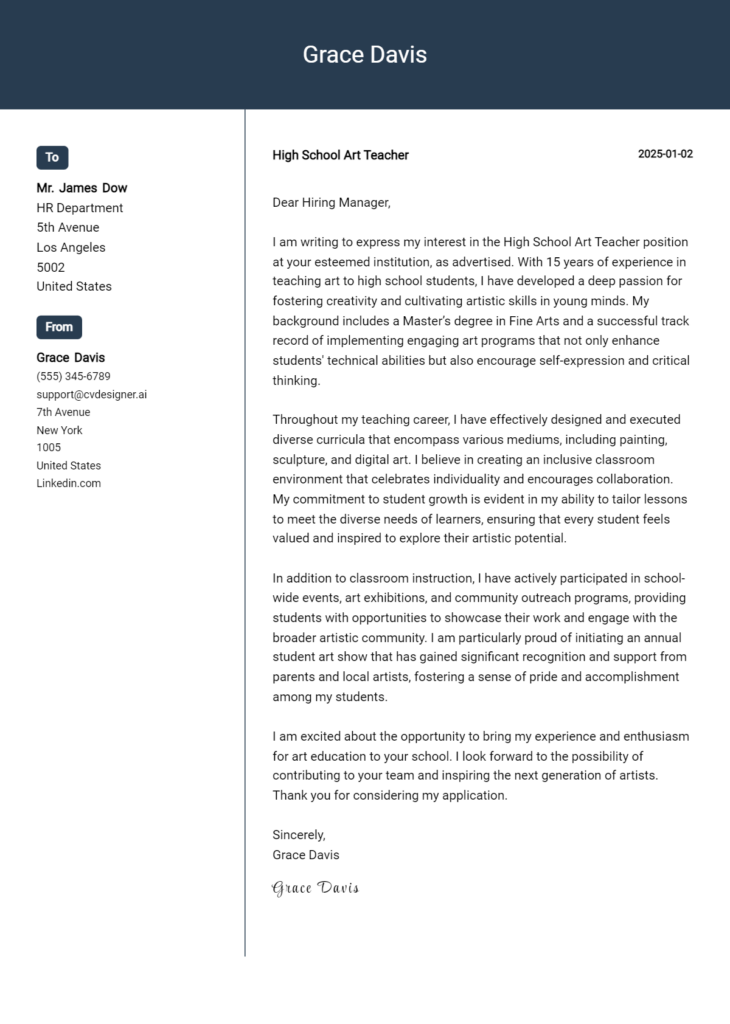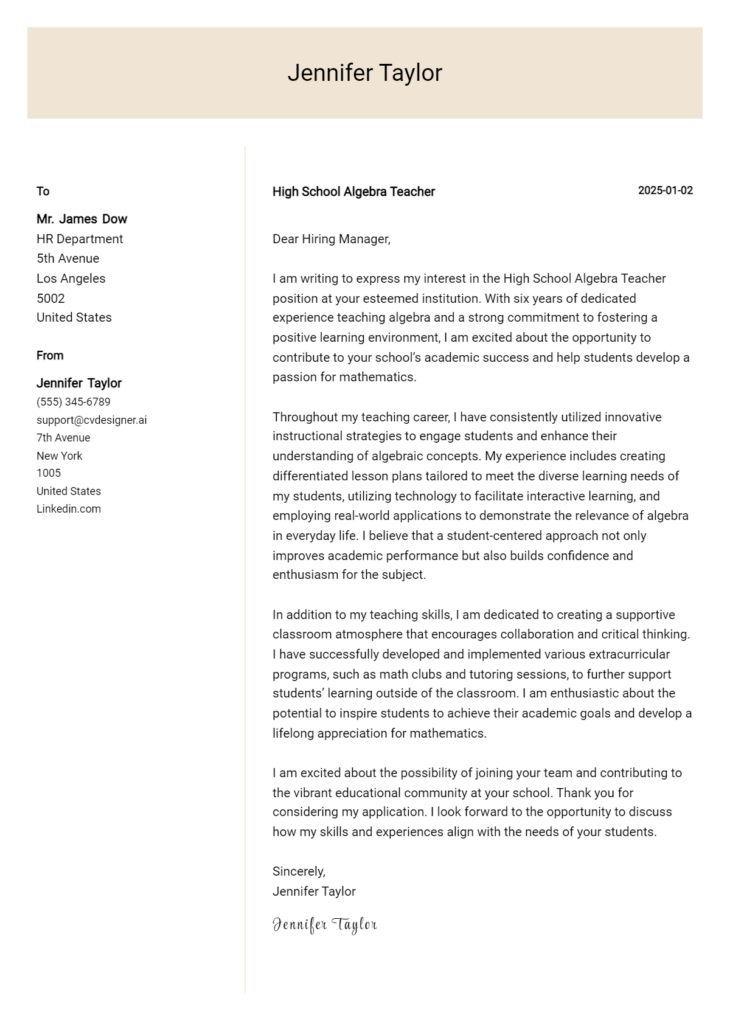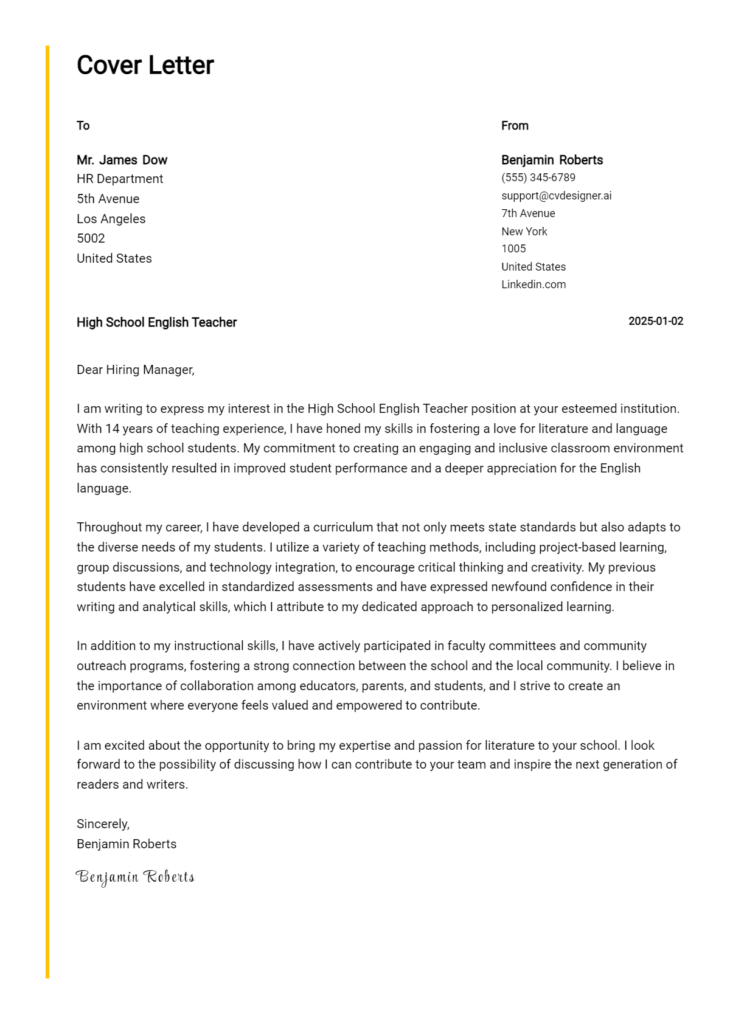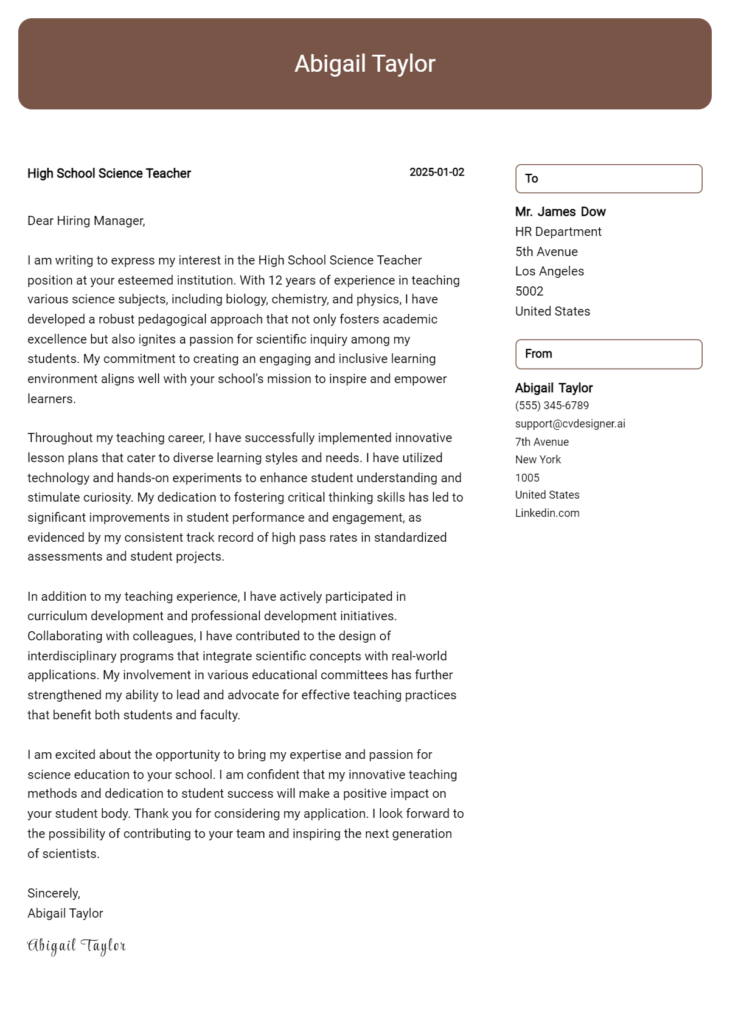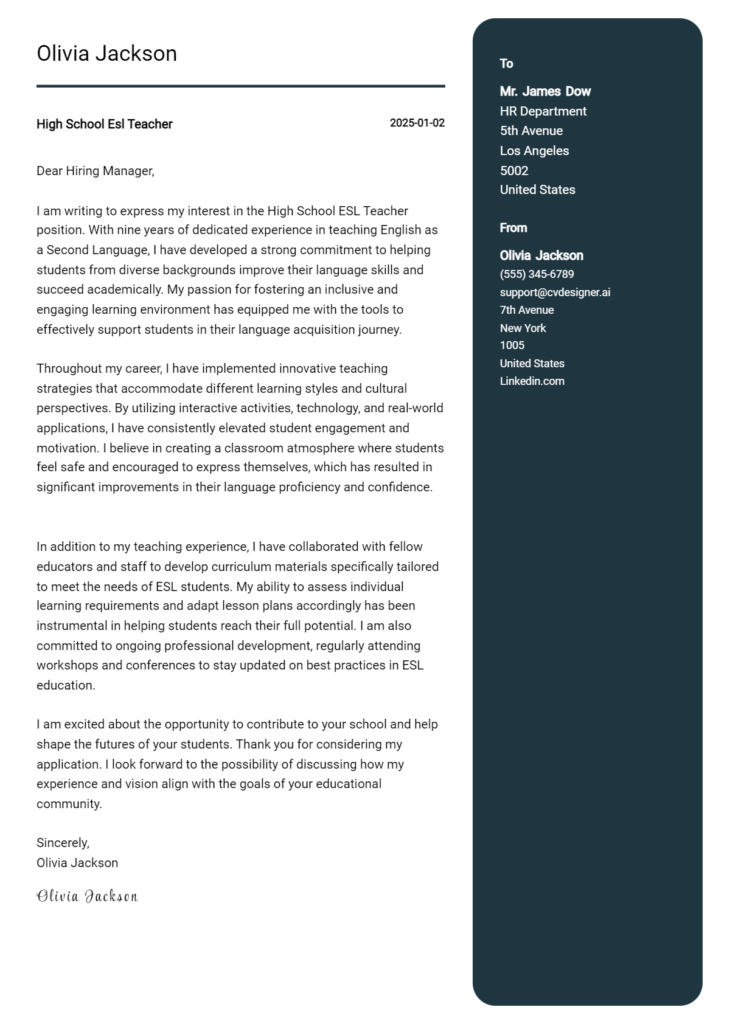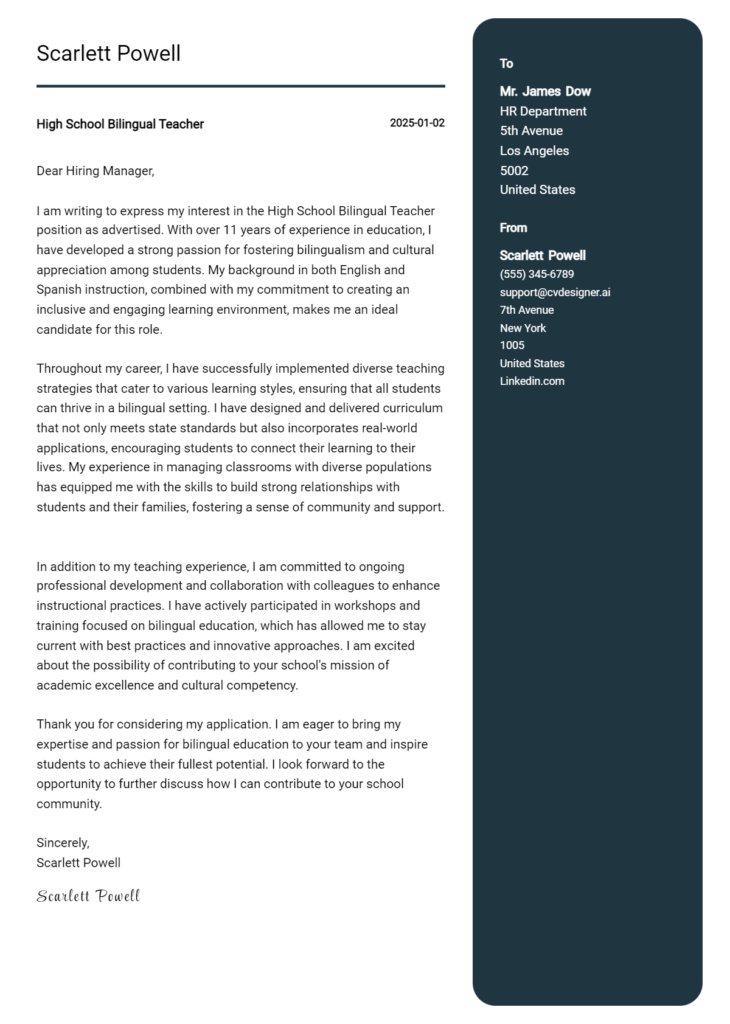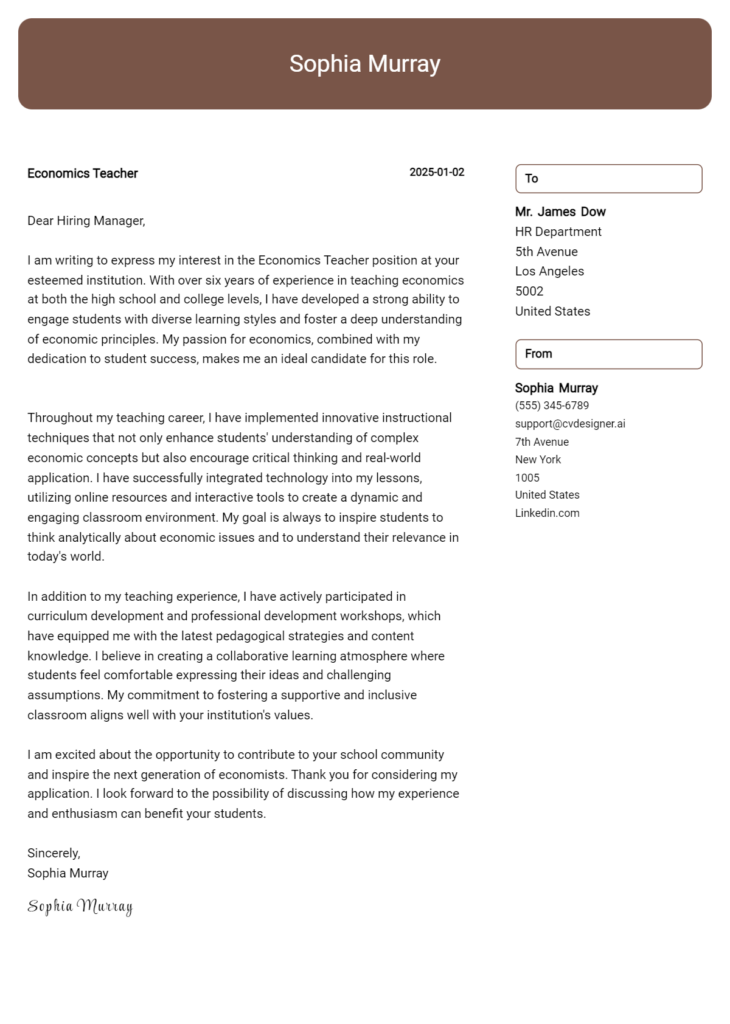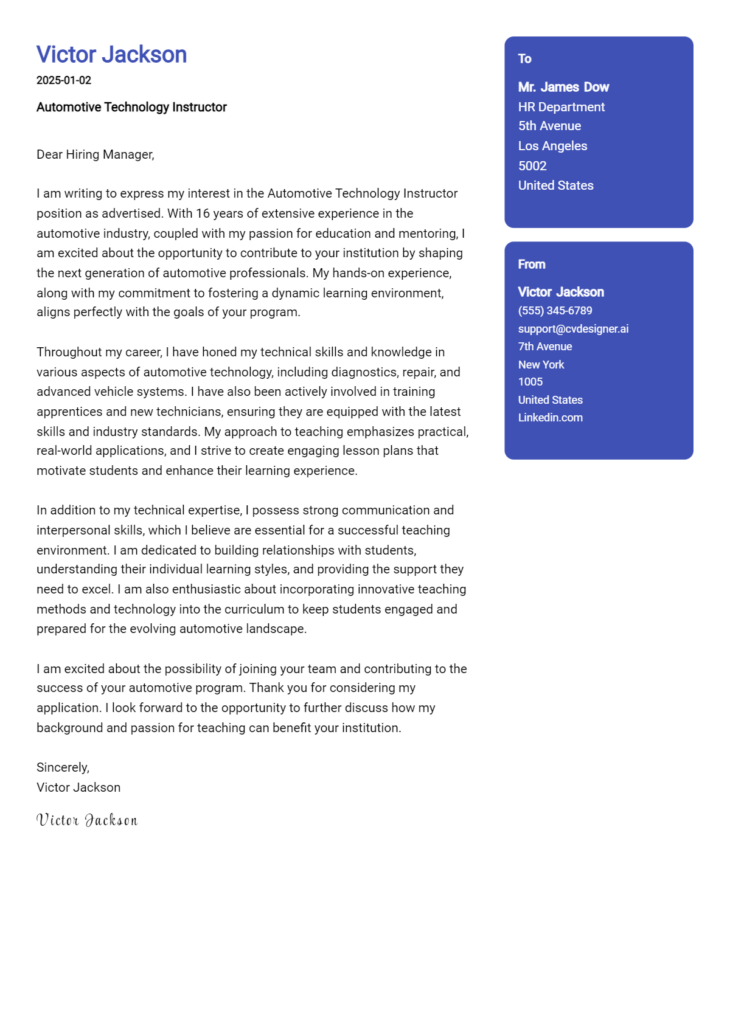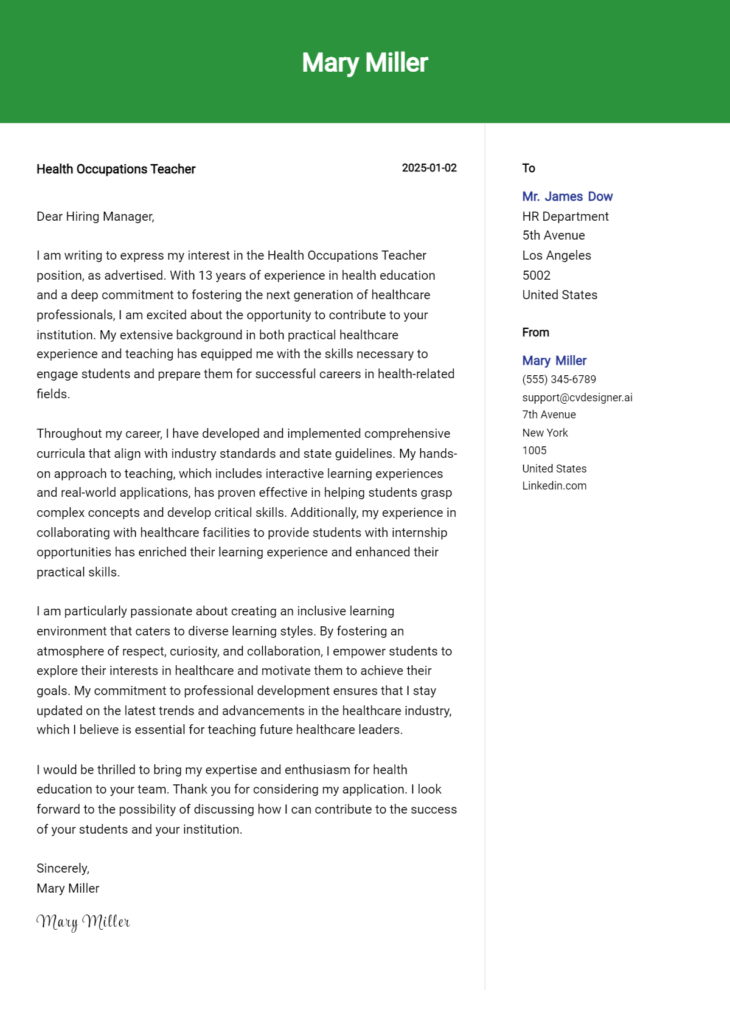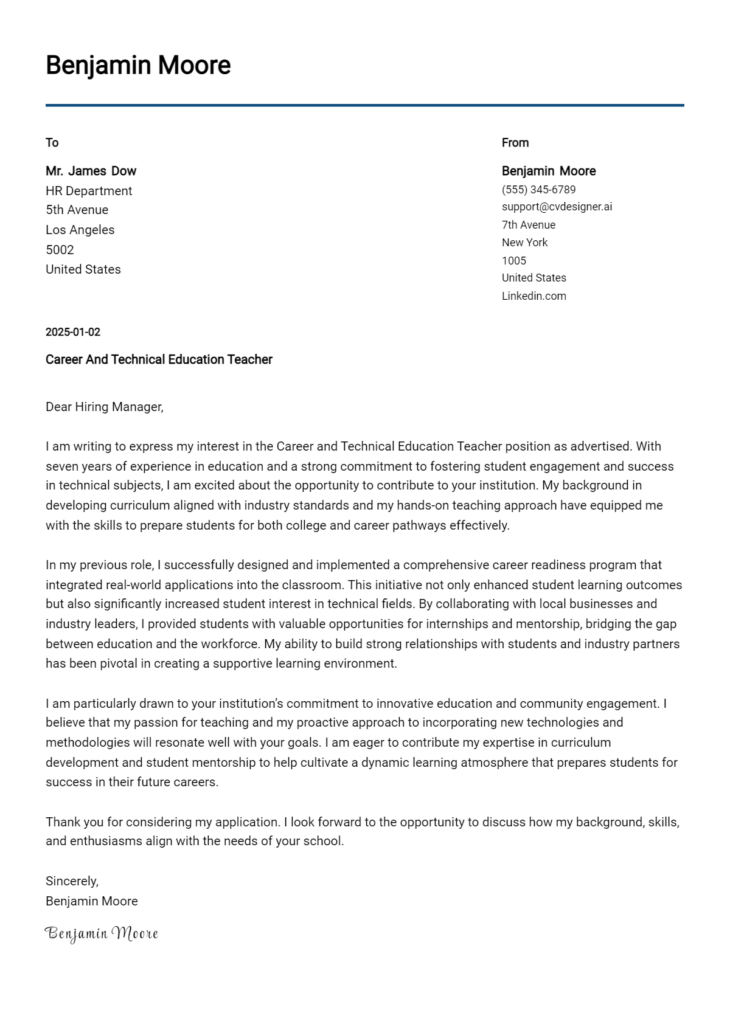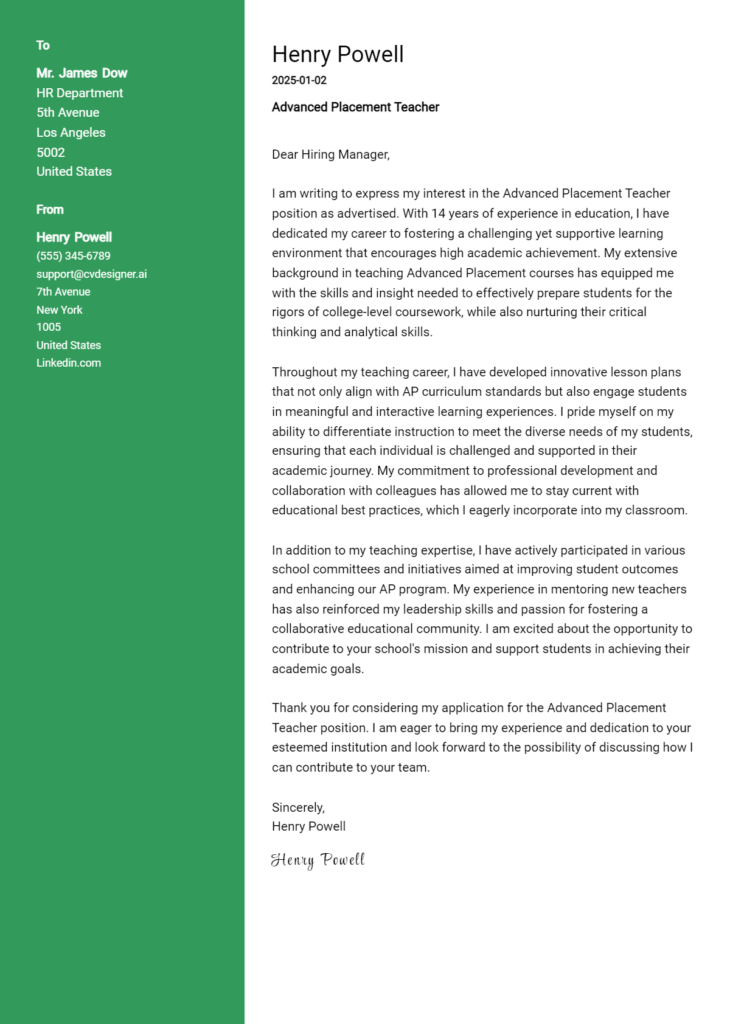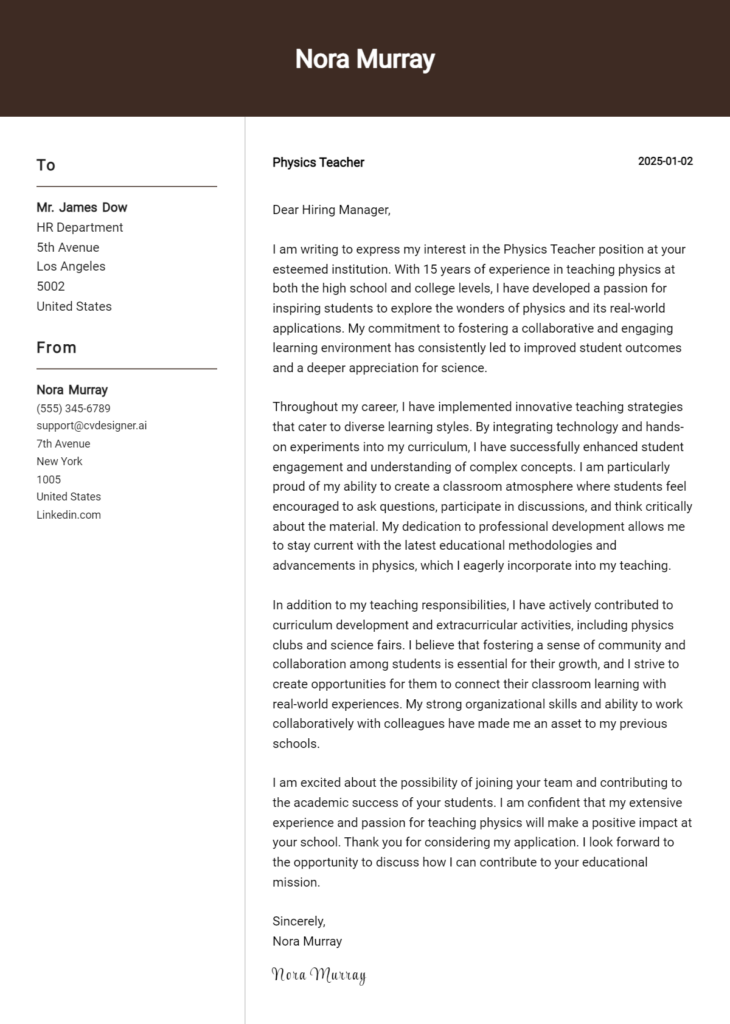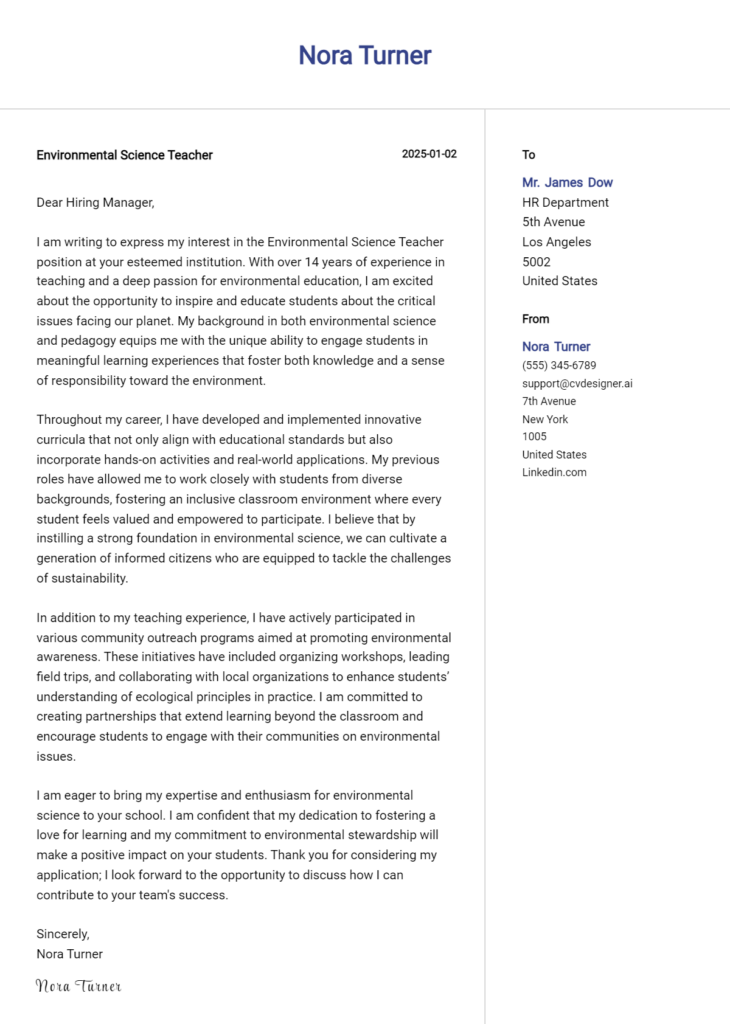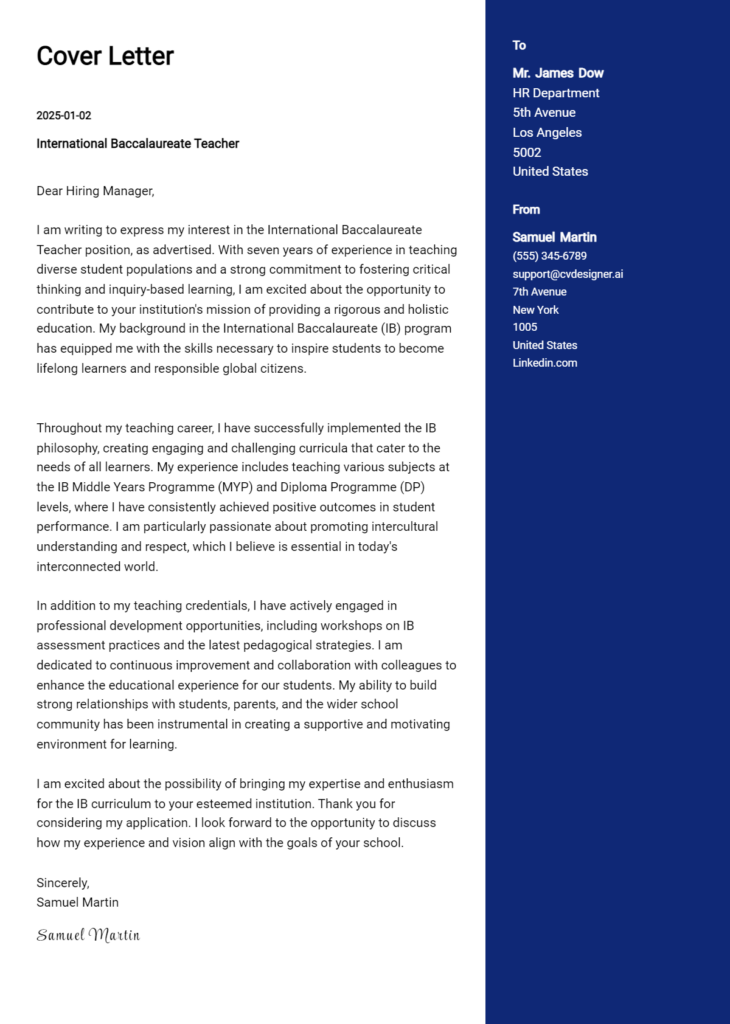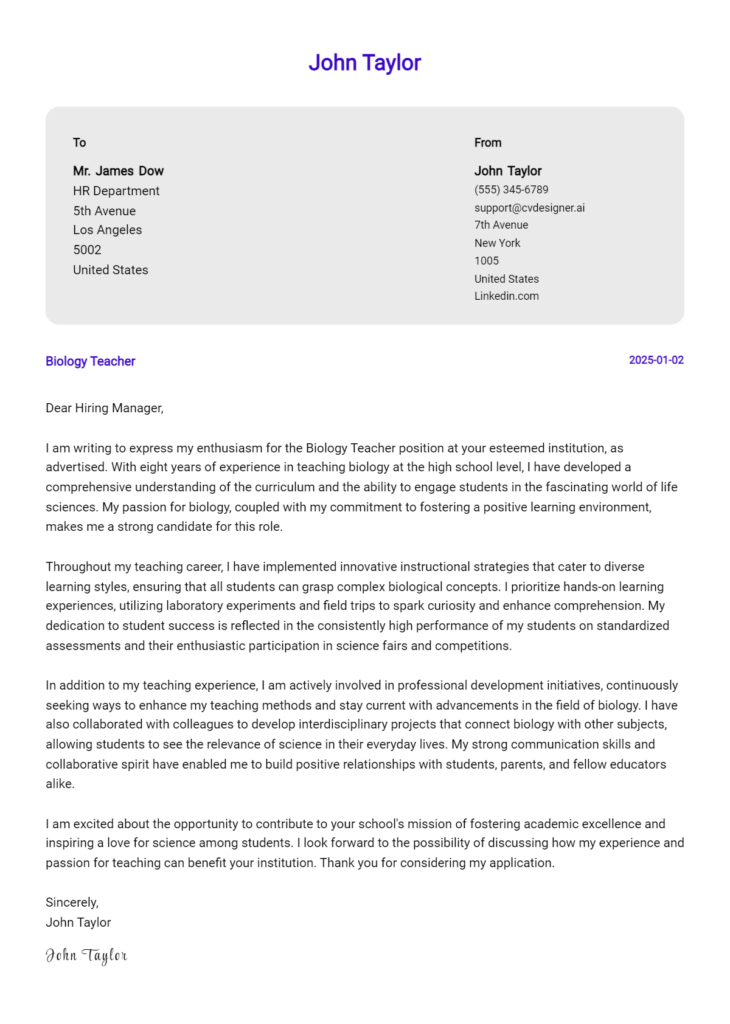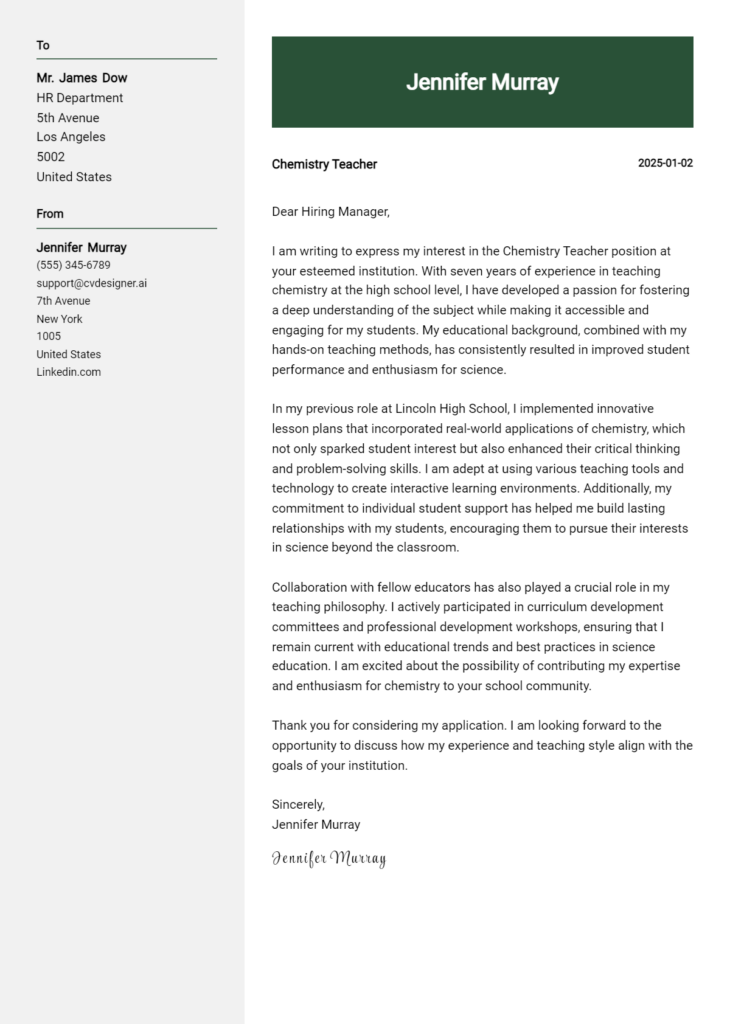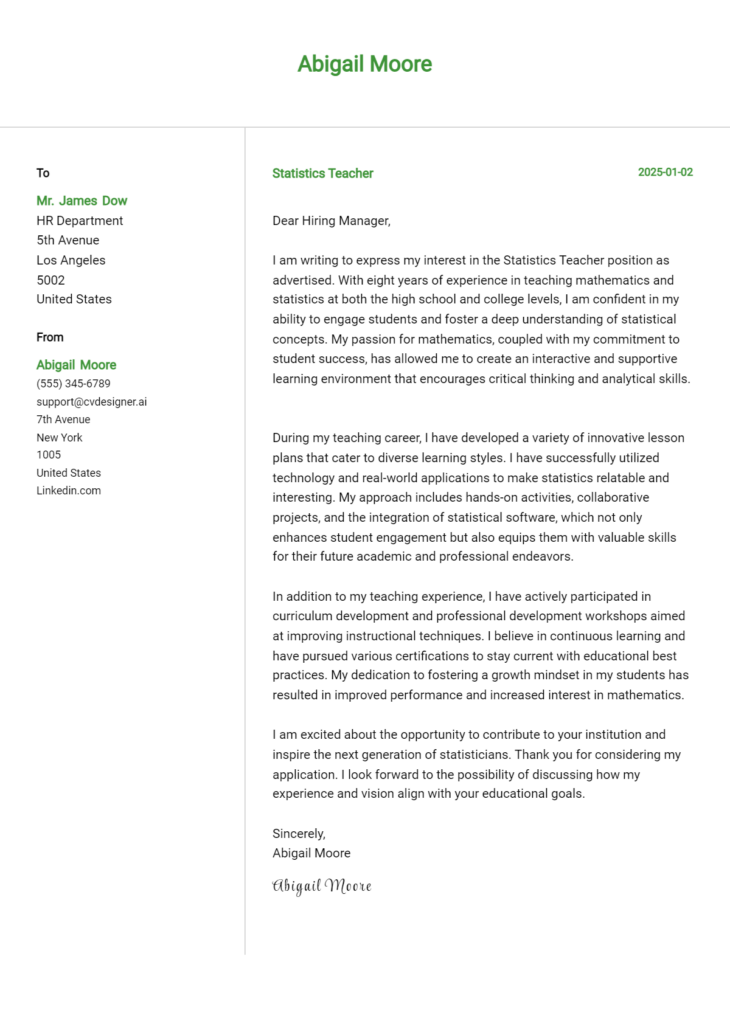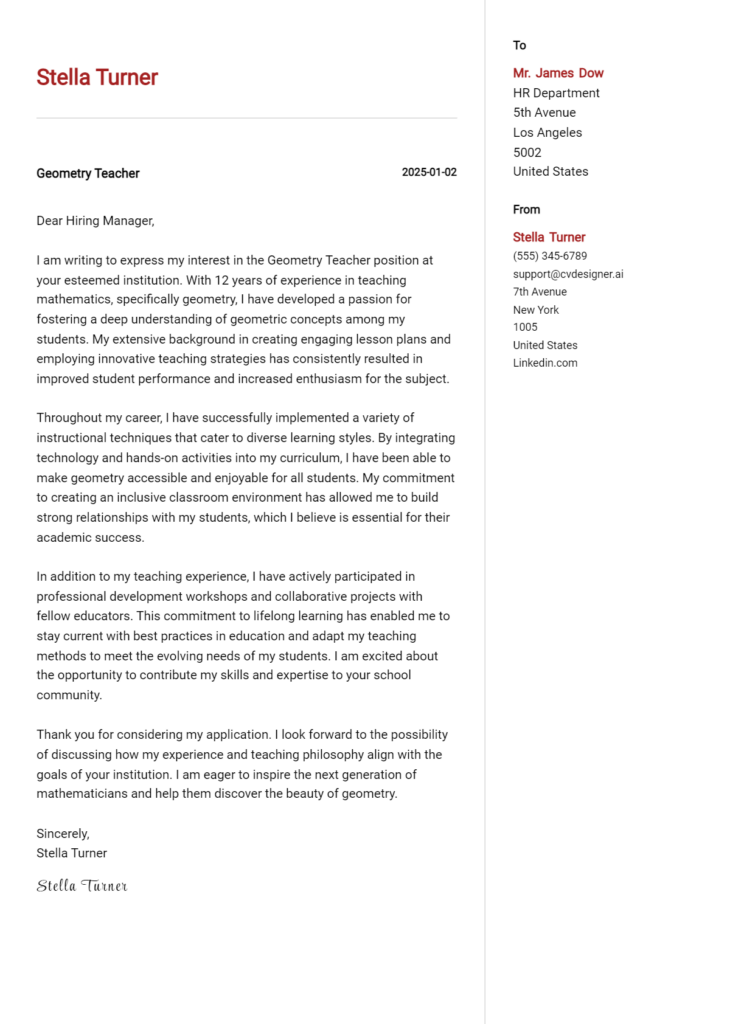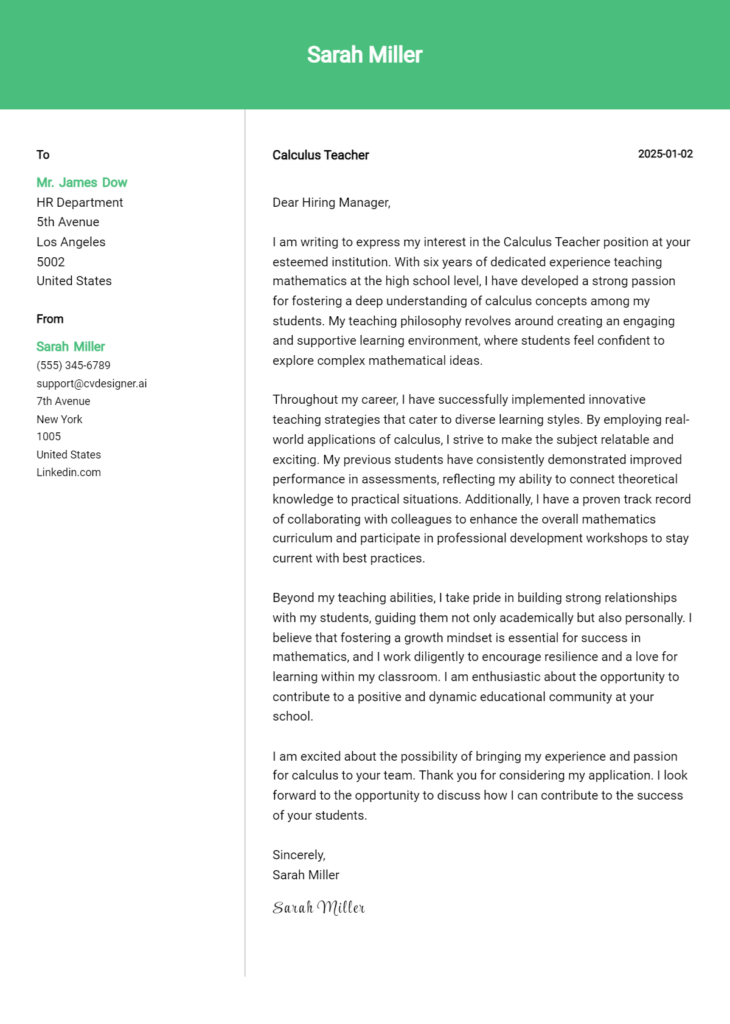Culinary Arts Instructor Cover Letter Examples
Explore additional Culinary Arts Instructor cover letter samples and guides and see what works for your level of experience or role.
How to Format a Culinary Arts Instructor Cover Letter
Crafting a compelling cover letter is essential for a Culinary Arts Instructor, as it not only showcases your culinary skills but also reflects your ability to educate and inspire future chefs. The way you present your experience and passion for cooking can greatly influence the hiring manager's perception of your suitability for the role. A well-structured cover letter helps convey your dedication to culinary excellence and effective teaching—qualities that are crucial in a culinary education setting.
In this guide, we'll outline how to structure your cover letter, providing insights and culinary-specific examples to help you craft an engaging document.
We'll focus on the fundamental components of a professional cover letter, including:
- Cover Letter Header
- Cover Letter Greeting
- Cover Letter Introduction
- Cover Letter Body
- Cover Letter Closing
Each section is vital for emphasizing your qualifications and professionalism. Let’s delve into each part and learn how to make your Culinary Arts Instructor cover letter truly stand out.
Importance of the Cover Letter Header for a Culinary Arts Instructor
The cover letter header is a crucial element in any job application, including for a Culinary Arts Instructor position. It provides essential information that sets the tone for your application and establishes your professionalism. A well-organized header should include your contact information, the date, and the recipient's details. This clarity not only helps the hiring manager easily reach you but also demonstrates your attention to detail and respect for the application process. A strong header can make a positive first impression, while a weak one can detract from your overall presentation.
Strong Example
John Doe 123 Culinary Lane Foodville, CA 90210 (555) 123-4567 johndoe@email.com October 1, 2023 Ms. Jane Smith Director of Culinary Arts Culinary Institute of America 123 Chef Street Culinary City, CA 90211
Weak Example
johndoe@email.com 10/1/23 Culinary Institute
The Importance of a Cover Letter Greeting for a Culinary Arts Instructor
The greeting of your cover letter is a critical component that sets the tone for the entire document. A well-crafted greeting not only showcases your professionalism but also demonstrates your interest in the position by personalizing the communication. Addressing the hiring manager directly can create a connection and shows that you have taken the time to research the organization. Avoiding generic greetings such as "To Whom It May Concern" reflects a lack of effort and can diminish the impact of your application. Instead, strive to find the recipient's name through the company website, LinkedIn, or by calling the institution directly. A personalized greeting can significantly enhance the first impression you make on the hiring committee.
Strong Greeting Example
Dear Chef Johnson,
Weak Greeting Example
To Whom It May Concern,
The Importance of a Compelling Cover Letter Introduction for a Culinary Arts Instructor
A well-crafted cover letter introduction is crucial for a Culinary Arts Instructor as it serves as the first impression for the hiring manager. This opening paragraph should not only capture their attention but also express genuine interest in the position while highlighting key skills or achievements that set the candidate apart from others. An engaging introduction can entice the reader to continue exploring the rest of the cover letter, making it essential for candidates to strike the right balance between professionalism and passion for culinary arts.
Strong Example
Dear [Hiring Manager's Name], As a dedicated Culinary Arts Instructor with over ten years of experience in both professional kitchens and educational settings, I am excited to apply for the position at [School/Institution Name]. My passion for teaching and my commitment to fostering creativity in the kitchen have resulted in numerous student accolades, including a national culinary competition award. I am eager to bring my expertise in modern culinary techniques and my innovative approach to curriculum development to inspire the next generation of chefs at your esteemed institution.
Weak Example
To Whom It May Concern, I am writing to apply for the Culinary Arts Instructor position. I have worked in kitchens for a while and think I would be good at teaching. I have some skills in cooking, and I hope to share them with students. I look forward to your response.
Cover Letter Body for Culinary Arts Instructor
The body of a cover letter for a Culinary Arts Instructor serves as a critical platform for candidates to articulate their unique qualifications and experiences in the culinary field. This section allows potential instructors to detail their teaching philosophy, culinary expertise, and any relevant accomplishments that demonstrate their capability to inspire and educate students. By highlighting specific projects, such as the development of a new curriculum or successful student competitions, candidates can effectively showcase their value to the institution. A well-crafted cover letter body not only outlines qualifications but also conveys passion for culinary education and the ability to foster a creative and inclusive learning environment.
Strong Example
As a Culinary Arts Instructor with over five years of experience at prestigious culinary schools, I successfully developed and implemented a farm-to-table curriculum that increased student engagement by 30%. My students consistently excelled in regional competitions, winning first place in the statewide culinary challenge for two consecutive years. I believe that my commitment to sustainability and hands-on learning will greatly enhance the culinary program at your institution, helping students to not only master techniques but also understand the importance of sourcing and seasonality in their dishes.
Weak Example
I have been teaching cooking for a while and know a lot about food. My students usually do okay in competitions. I think I would be a good fit for your school because I like cooking and teaching.
Importance of the Cover Letter Closing for a Culinary Arts Instructor
The closing of a cover letter is crucial for leaving a lasting impression on potential employers, especially for a Culinary Arts Instructor position. It serves as a final opportunity to summarize your qualifications, express enthusiasm for the role, and encourage the recipient to take the next steps, such as reviewing your resume or scheduling an interview. A strong closing can reinforce your passion for culinary education and your commitment to fostering student success, while a weak closing may leave the employer with doubts about your fit for the role or your eagerness to join their team.
Strong Example
Thank you for considering my application for the Culinary Arts Instructor position. With over ten years of experience in professional kitchens and a passion for teaching, I am excited about the opportunity to inspire the next generation of chefs at your esteemed institution. I look forward to the possibility of discussing how my skills and background align with your program's goals. Please feel free to contact me to schedule an interview at your earliest convenience. I am eager to contribute to your culinary team and help cultivate a love of cooking in your students.
Weak Example
I guess I would be a good fit for the Culinary Instructor job. I hope you look at my resume. Let me know if you want to talk.
Crafting an effective cover letter for a Culinary Arts Instructor position is key to standing out in a competitive job market. Your cover letter should not only highlight your technical skills and problem-solving abilities but also demonstrate your knowledge of the culinary arts and your commitment to teamwork and continuous learning. The following tips will help you articulate these strengths, making your application more appealing to potential employers.
Tips for Writing a Cover Letter for a Culinary Arts Instructor
Showcase Your Technical Skills
Clearly outline your culinary expertise, including specific techniques, cuisines, or cooking methods you excel in. Mention any certifications or degrees you hold, such as a degree in Culinary Arts or specialized training in pastry-making or nutrition. This establishes your credibility and expertise in the field.Emphasize Problem-Solving Abilities
As a Culinary Arts Instructor, you'll face challenges in the kitchen and the classroom. Share examples of how you've successfully navigated difficult situations, such as adapting recipes for dietary restrictions or resolving conflicts in team projects. Highlighting your problem-solving skills will illustrate your ability to manage a dynamic learning environment.Highlight Your Knowledge of SDLC
While not commonly associated with culinary arts, mentioning your understanding of the Software Development Life Cycle (SDLC) can set you apart, especially if you incorporate technology into your teaching methods. Discuss how you leverage culinary software for menu planning, inventory management, or instructional purposes, showing your adaptability and modern teaching approach.Demonstrate Teamwork and Collaboration
Culinary arts is often about collaboration. Share experiences where you worked effectively as part of a kitchen brigade or collaborated with fellow instructors in curriculum development. Use these examples to showcase your ability to foster a cooperative learning environment and mentor students through teamwork.Convey Your Passion for Continuous Learning
The culinary world is ever-evolving, and a successful instructor must stay abreast of trends and techniques. Discuss any ongoing education you pursue, such as workshops, courses, or culinary competitions. This demonstrates your commitment to not only your own growth but also to providing students with the most up-to-date knowledge and skills.
For more assistance in crafting your cover letter, consider exploring cover letter templates or using a cover letter builder to streamline the process. These resources can provide you with a solid foundation to create a compelling narrative that showcases your strengths as a Culinary Arts Instructor.
Common Mistakes to Avoid in a Culinary Arts Instructor Cover Letter
Avoiding common mistakes in a cover letter is crucial for standing out in the competitive field of culinary arts education. A well-crafted cover letter can showcase your passion and qualifications, while errors can undermine your candidacy. Here are some frequent pitfalls to avoid when writing your cover letter for a Culinary Arts Instructor position:
Generic Language: Using a one-size-fits-all template can make your application feel impersonal. Tailor your letter to the specific institution and role by mentioning their culinary program and your relevant experience.
Neglecting Formatting: Poor formatting can distract from your message. Ensure that your cover letter follows a professional cover letter format and is easy to read.
Lack of Specific Examples: Failing to provide concrete examples of your teaching experience or culinary achievements can weaken your letter. Highlight specific accomplishments or techniques you have taught in previous roles.
Overlooking Spelling and Grammar: Typos can suggest a lack of attention to detail. Always proofread your letter and consider using tools or asking a colleague to review it before submission.
Ignoring the Job Description: Not addressing the skills or qualifications mentioned in the job description can make your letter seem unfocused. Align your experiences and skills with the requirements stated in the listing.
Failing to Showcase Passion: A cover letter should convey your enthusiasm for culinary arts and education. Share your motivations for teaching and how you inspire students in the kitchen.
Being Too Formal or Casual: Striking the right tone is essential. Avoid overly formal language or a casual tone; instead, aim for a professional yet approachable style.
By steering clear of these common mistakes, you can create a compelling cover letter that enhances your chances of securing a Culinary Arts Instructor position. For inspiration, check out some cover letter examples to find a style that resonates with you.
Cover Letter FAQs for Culinary Arts Instructor
What should I include in my cover letter for a Culinary Arts Instructor position?
Your cover letter should highlight your culinary qualifications, teaching experience, and passion for culinary arts. Start with a strong introduction that specifies the position you're applying for. Detail your educational background, including any degrees or certifications in culinary arts. Mention your teaching experience, emphasizing your ability to engage students and create an interactive learning environment. Include specific examples of successful classes you’ve taught or innovative curriculum you’ve developed. Finally, express your enthusiasm for the role and how you can contribute to the institution’s goals, showcasing your commitment to fostering a love for cooking among students.
How can I demonstrate my teaching philosophy in my cover letter?
To effectively convey your teaching philosophy, use specific examples that showcase your approach to education. Explain how you prioritize hands-on learning, collaboration, and creativity in your culinary classes. Discuss your strategies for accommodating diverse learning styles and ensuring all students feel included and engaged. You might mention how you incorporate current culinary trends or use seasonal ingredients to inspire students. Highlight any feedback or success stories from previous students that reflect the positive impact of your teaching methods. This personalized approach will provide a clearer picture of your dedication to student success and your passion for culinary education.
Should I mention my industry experience in my cover letter?
Absolutely! Your industry experience is crucial in establishing your credibility as a Culinary Arts Instructor. Highlight relevant roles you’ve had in professional kitchens, catering services, or restaurants, and describe the skills you developed during those experiences. Discuss any leadership positions or mentorship roles you’ve held, as these demonstrate your ability to guide and inspire future chefs. Additionally, mention any awards or recognitions you’ve received in the culinary field. This information not only reinforces your qualifications but also shows that you bring real-world insights and practical knowledge to the classroom, enriching the learning experience for your students.
How can I tailor my cover letter for a specific culinary school?
To tailor your cover letter for a specific culinary school, start by researching the institution’s mission, values, and unique programs. Reference these aspects in your cover letter to demonstrate your alignment with their educational approach. If the school emphasizes sustainability, for example, discuss your experiences with farm-to-table practices or teaching students about responsible sourcing. Mention any specific courses or workshops you’re excited to teach that align with the school’s curriculum. Additionally, reflecting on any community involvement or outreach programs the school participates in can show your commitment to contributing positively to their environment. This personalized touch can make your application stand out.
Build your Cover Letter in minutes
Use an AI-powered cover letter builder and have your letter done in 5 minutes. Just select your template and our software will guide you through the process.

